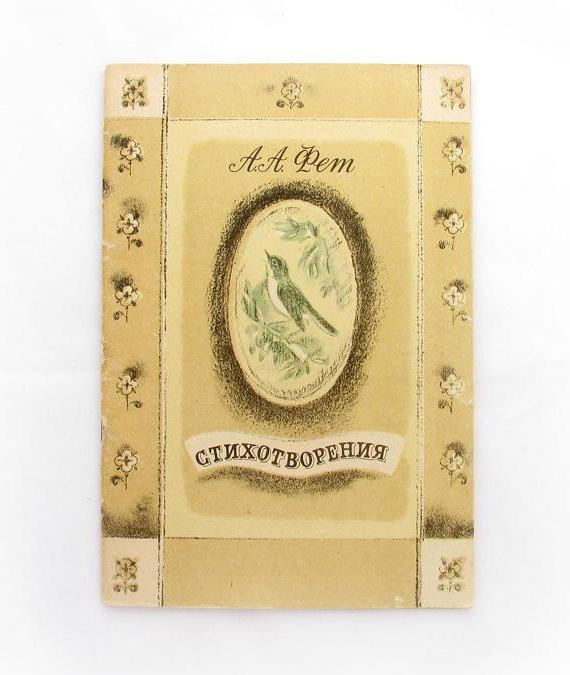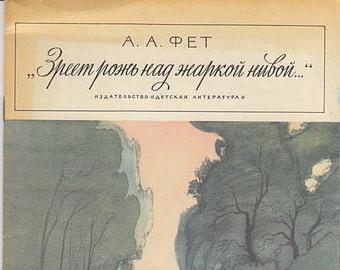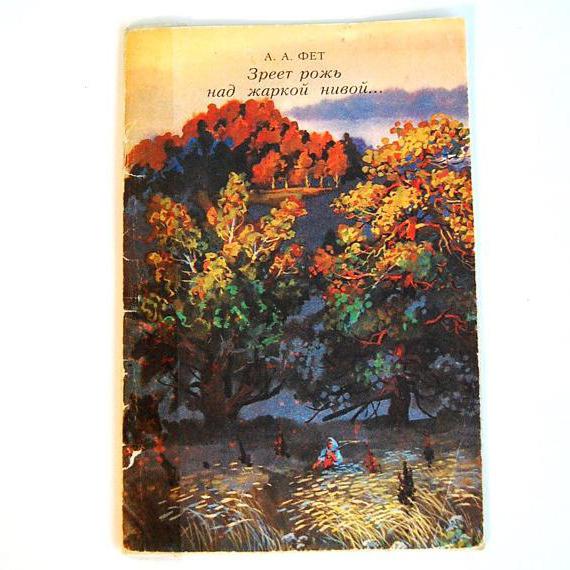
November 23, 1820 in the village of Novoselki,located near Mtsensk, the family of Karolina Charlotte Fet and Athanasius Neophytovich Shenshin was born the great Russian poet Afanasy Afanasyevich Fet. His parents were married without an Orthodox rite abroad (the poet's mother was a Lutheran), which is why the marriage, legalized in Germany, was declared invalid in Russia.
Later, when the wedding wasOrthodox rite, Afanasy Afanasyevich already lived under the mother's name - Fet, being considered her illegitimate child. The boy was deprived, except his father's surname, and the noble title, Russian citizenship and inheritance rights. For the boy for many years, the most important life goal was to regain the surname Shenshin and all related rights. Only under the old age he was able to achieve this, returning to himself a hereditary nobility.

The future poet in 1838 entered the boarding houseProfessor Pogodin in Moscow, and in August of the same year he was enrolled in the verbal department at Moscow University. In the family of his classmate and friend Apollo Grigoriev, he spent his student years. The friendship of young people contributed to the formation of their common ideals and views on art.
Afanasy Afanasyevich begins to write poems, and inIn 1840, a poetry collection published at his own expense called "The Lyrical Pantheon" was published. In these poems, echoes of Yevgeny Baratynsky, Vasily Zhukovsky and Ivan Kozlov’s poetic works were clearly heard. Since 1842, Afanasy Afanasyevich constantly published in the journal "Notes of the Fatherland". Already in 1843, Vissarion Grigorievich Belinsky wrote that, of all the poets living in Moscow, Fet was "all talented", and poems by this author on a par with the works of Mikhail Yuryevich Lermontov.
Fet sought literary activity throughoutsoul, but the instability of the material and social situation forced the poet to change his fate. Afanasy Afanasyevich in 1845 enters a non-commissioned officer in one of the regiments located in the Kherson province, in order to be able to get hereditary nobility (the right to which was given by the senior officer rank). Cut off from the literary environment and metropolitan life, it almost ceases to be printed, also because, due to a fall in the demand for poetry, the journals show no interest in his poems.
In the Kherson years happened predeterminedthe poet’s private life is a tragic event: his beloved Maria Lazic, a dormitory girl whom he did not dare to marry because of her poverty, died in the fire. After Fet’s refusal, a strange incident happened to her: a dress caught fire on Maria, she ran into the garden, but did not cope with putting out her clothes and suffocated in the smoke. In this, one might suspect the girl’s attempt to commit suicide, and echoes of this tragedy will be heard in Fet’s verses for a long time (for example, the poem “When you read painful lines ...”, 1887).

In 1853 there is a sharp turn in destinypoet: he managed to enter the Guard, in the Ulansky regiment stationed near St. Petersburg of the Life Guard. Now Afanasy Afanasyevich gets the opportunity to visit the capital, resumes his literary activities, begins to regularly publish poems in Sovremennik, Russian Herald, Domestic Notes, Library for Reading. He approaches with Ivan Turgenev, Nikolai Nekrasov, Vasily Botkin, Alexander Druzhinin - the editors of Sovremennik. The name Fet, by that time already half-forgotten, reappears in reviews, articles, magazine chronicles, and since 1854 his poems have been printed. Ivan Sergeevich Turgenev became a mentor to the poet and even prepared a new edition of his works in 1856.
Fet had no luck in the service:each time they tightened the rules for obtaining hereditary nobility. In 1856 he left a military career, and not having achieved his main goal. In Paris in 1857, Afanasy Afanasyevich married the daughter of a wealthy merchant, Maria Petrovna Botkina, and acquired an estate in Mtsensk. At that time, he almost did not write poetry. As a supporter of conservative views, Fet sharply negatively perceived the abolition of serfdom in Russia and, beginning in 1862, began to regularly publish essays in the Russian Herald, which from the landowner-landowner position exposed the post-reform order. In 1867-1877, he served as magistrate. In 1873, finally, Afanasy Afanasyevich receives hereditary nobility.
The poet returns to literature only in the 1880syears, moved to Moscow and became rich. In 1881, his long-cherished dream was fulfilled - the translation of his beloved philosopher, Arthur Schopenhauer, “Peace as Will and Representation” created by him came out. In 1883, a translation of all the writings of the poet Horace, begun by Fet in his student years, is published. The period from 1883 to 1991 includes the publication of four editions of the poetic collection "Evening Lights".
Poetry of Afanasy Afanasyevich, according to its originsromantic, is a link between the work of Vasily Zhukovsky and Alexander Blok. Late poems of the poet to Tyutchev tradition. The main lyrics of Feta are love and landscape.
In the 1950s-1960s, during the formation of AthanasiusAfanasyevich as a poet, Nekrasov and his supporters, apologists of poetry praising social and civic ideals, almost completely dominated the literary environment. Therefore, Afanasy Afanasyevich with his work, one might say, spoke somewhat out of time. The features of Fet's lyrics did not allow him to join Nekrasov and his group. After all, according to representatives of civic poetry, poems must necessarily be topical, performing a propaganda and ideological task.

Feta's philosophical lyrics pervade himcreativity, reflected in landscape and love poetry. Although Afanasy Afanasyevich was even friends with many poets of the Nekrasov circle, he argued that art should not be interested in anything other than beauty. Only in love, nature and art itself (painting, music, sculpture), he found lasting harmony. Philosophical lyrics Feta sought to get as far as possible from reality, contemplating beauty that was not involved in the bustle and bitterness of everyday life. This led to the adoption in the 1940s by Afanasy Afanasyevich of romantic philosophy, and in the 1960s - the so-called theory of pure art.
The prevailing mood in his works -ecstasy of nature, beauty, art, memories, delight. These are the features of Fet's lyrics. Often, the poet has the motive of flying away from the earth following the moonlight or enchanting music.
Everything that belongs to the category of the sublime andthe beautiful is endowed with wings, first of all the feeling of love and the song. Feta's lyrics often use metaphors such as winged dream, winged song, winged hour, winged sound, winged with enthusiasm, and others.
Epithets in his works usually do not describethe object itself, and the impression of the lyrical hero from what he saw. Therefore, they may be inexplicable logically and unexpected. For example, a violin can get the definition of "melting." Epithets characteristic of Feta are "dead dreams", "incense speeches", "silver dreams", "herbs in sobs", "widowed azure", etc.
Often the picture is drawn with the help of visualassociations. The poem "The Singer" is a vivid example. It shows the desire to translate the sensations created by the melody of the song into specific images and sensations of which Fet's lyrics consist.
These poems are very unusual.Thus, the distance is ringing, and the smile of love shines meekly, the voice burns, and freezes away, like a dawn over the sea, in order to splash pearls out again with a loud tide. At that time, Russian poetry did not know such complex, bold images. They were established much later, only with the advent of the Symbolists.
Speaking about the creative style of Feta, they also mention impressionism, which is based on the direct fixation of impressions of reality.

Landscape lyrics Feta - the source of the divinebeauty in perpetual renewal and diversity. Many critics have mentioned that nature is described by this author as if from the window of a manor house or from the perspective of the park, as if specifically to cause admiration. Landscape lyrics Feta is a universal expression of the beauty of the world untouched by man.
Природа для Афанасия Афанасьевича - часть own "I", the background for his experiences and feelings, a source of inspiration. The lyrics of Fet seem to blur the line between the outer and the inner world. Therefore, human properties in his poems can be attributed to darkness, air, even color.
Very often the nature in the lyrics Feta - this is the nightlandscape, since it is at night when the daily bustle of the day calms down, it is easiest to enjoy a comprehensive, indestructible beauty. At this time of day the poet has no glimpses of chaos, spellbinding and frightening Tyutchev. Majestic harmony hidden by day reigns. Not the wind and darkness, and the stars and the moon come out on top. By the stars reads Fet "fiery book" of eternity (poem "Among the stars").
Themes of Fet's lyrics are not limited to the description of nature. A special section of his work is poetry dedicated to love.

Love for the poet is a whole sea of feelings:and timid longing, and the enjoyment of intimacy, and the apotheosis of passion, and the happiness of two souls. The poetic memory of this author knew no bounds, which allowed him to write poems dedicated to his first love, even on the slope of his years, as if he were still impressed by the much desired recent date.
Most often, the poet described the emergence of feelingsthe most enlightened, romantic and reverent his moments: the first contact of hands, long looks, the first evening walk in the garden, creating spiritual closeness contemplation of the beauty of nature. The lyrical hero says that no less than happiness himself, he values steps towards him.
Feta's landscape and love lyrics make upindivisible unity. Aggravated perception of nature is often caused by love experiences. A vivid example of this is the miniature "Whisper, timid breath ..." (1850). The fact that there are no verbs in the poem is not only an original device, but also a whole philosophy. There is no action, because only one moment or a whole series of moments, fixed and self-sufficient, is actually described. The image of the beloved, described by way of detailing, seems to dissolve in the general range of feelings of the poet. There is no integral portrait of the heroine - it should be supplemented and recreate the reader's imagination.

Love in the lyrics Feta is often complemented by othersmotives. So, in the poem "Shining night. The moon was full of the garden ..." three feelings are united in unison: the admiration for music, the ravishing night and the inspired singing, turning into love for the singer. The poet’s whole soul is dissolved in music and at the same time in the soul of the singing heroine, who is the living embodiment of this feeling.
Это стихотворение трудно причислить однозначно к love lyrics or poems about art. It would be more accurate to define it as a hymn to beauty, combining the liveliness of experience, its charm with deep philosophical overtones. Such a worldview is called aestheticism.
Afanasy Afanasyevich, carried away on the wingsinspiration beyond earthly existence, feels like a sovereign, equal to gods, by the power of his poetic genius overcoming the limited possibilities of man.

All the life and work of this poet - searchbeauty in love, nature, even death. Could he find her? This question can only be answered by someone who really understood the creative heritage of this author: he heard the music of his works, saw landscape canvases, felt the beauty of the poetic lines and learned how to find harmony in the surrounding world.
We reviewed the main motifs of Fet's lyrics,characteristic features of the work of this great writer. For example, like any poet, Afanasy Afanasyevich writes about the eternal topic of life and death. He is not afraid of the same death or life ("Poems about death"). By physical death, the poet experiences only cold indifference, and earthly existence is justified by Afanasy Afanasyevich Fet only by creative fire, commensurate in his view with the "whole universe." Antique motifs (for example, "Diana") and Christian ("Ave Maria", "Madonna") sound in verses.
You can find more detailed information on Fet's works in school textbooks on Russian literature, in which the lyrics of Afanasy Afanasyevich are discussed in some detail.


























